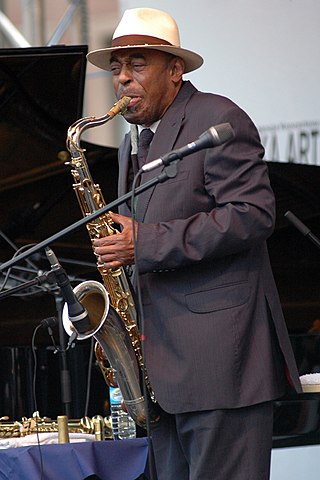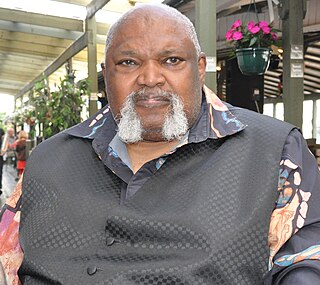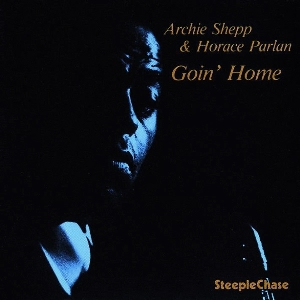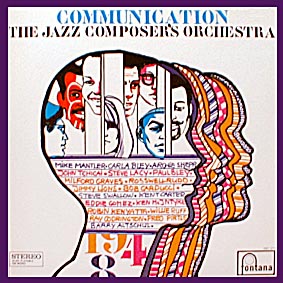
Archie Shepp is an American jazz saxophonist, educator and playwright who since the 1960s has played a central part in the development of avant-garde jazz.

Theodore Curson was an American jazz trumpeter.

John Martin Tchicai was a Danish free jazz saxophonist and composer.

Ascension is a jazz album by John Coltrane recorded in June 1965 and released in 1966. It is considered a watershed in Coltrane's work, with the albums recorded before it being more conventional in structure and the albums recorded after it being looser, free jazz inspired works. In addition, it signaled Coltrane's interest in moving away from the quartet format. AllMusic called it "the single recording that placed John Coltrane firmly into the avant-garde".

Goin' Home is a studio album by American saxophonist Archie Shepp and pianist Horace Parlan. After their work in the 1960s, Shepp and Parlan both faced career challenges as the jazz scene diverged stylistically. They left the United States for Europe during the 1970s and met each other in Denmark before recording the album on April 25, 1977, at Sweet Silence Studio in Copenhagen.
Eddie Preston was an American jazz trumpeter.
The New York Contemporary Five was an avant-garde jazz ensemble active from the summer of 1963 to the spring of 1964. It has been described as "a particularly noteworthy group during its year of existence -- a pioneering avant-garde combo" and "a group which, despite its... short lease on life, has considerable historical significance." Author Bill Shoemaker wrote that the NYCF was "one of the more consequential ensembles of the early 1960s." John Garratt described them as "a meteor that streaked by too fast."

Four for Trane is a studio album by tenor saxophonist Archie Shepp released on Impulse! Records in 1965. Four of the five tracks were composed and originally recorded by John Coltrane and rearranged by Shepp and trombonist Roswell Rudd. The other featured players are trumpeter Alan Shorter, alto saxophonist John Tchicai, bassist Reggie Workman and drummer Charles Moffett. Coltrane himself co-produced the album alongside Bob Thiele. The album was Shepp's first release for Impulse!

Cell Walk for Celeste is an album by Cecil Taylor recorded for the Candid label in January 1961 but not released until 1988. The album features performances by Taylor with Archie Shepp, Buell Neidlinger and Denis Charles. Additional recordings from these sessions were released on New York City R&B in 1971 and Jumpin' Punkins in 1987.

Jumpin' Punkins is an album by Cecil Taylor recorded for the Candid label in January 1961 but not issued in the States until 1987. The first release was in Japan by Victor in 1977 as Cecil Taylor All Stars Featuring Buell Neidlinger. The album features performances by Taylor with Archie Shepp, Buell Neidlinger and Denis Charles with Billy Higgins, Clark Terry, Roswell Rudd, Steve Lacy and Charles Davis added on one track. Additional recordings from these sessions were released on New York City R&B in 1971 and Cell Walk for Celeste in 1988.

Mixed is a compilation album of two avant-garde jazz sessions featuring performances by the Cecil Taylor Unit and the Roswell Rudd Sextet. The album was released on the Impulse! label in 1998 and collects three performances by Taylor with Archie Shepp, Jimmy Lyons, Henry Grimes and Sunny Murray with Ted Curson and Roswell Rudd added on one track which were originally released under Gil Evans' name on Into the Hot (1961). The remaining tracks feature Rudd with Giuseppi Logan, Lewis Worrell, Charlie Haden, Beaver Harris and Robin Kenyatta and were originally released as Everywhere (1966). Essentially these are the three Cecil Taylor tracks from the "Gil Evans album" teamed with Roswell Rudd's Impulse album Everywhere, in its entirety.

Archie Shepp – Bill Dixon Quartet is the debut album by saxophonist Archie Shepp and trumpeter Bill Dixon released on the Savoy label in 1962. The album features three performances by Shepp & Dixon with Don Moore and Paul Cohen and a version of Ornette Coleman's composition "Peace" with Reggie Workman and Howard McRae. The album was also rereleased in 1970 as Peace on the French BYG label, flipping the running order on side two, and on CD in 2010 as a "unauthorized European" edition on the Free Factory label, using the Savoy title but the BYG running order.

Consequences is the debut album by the New York Contemporary Five featuring saxophonists Archie Shepp and John Tchicai, trumpeter Don Cherry, bassist Don Moore and drummer J. C. Moses. The album was released on the Fontana label in 1966. In 2020, the Ezz-thetics label re-released the material from Consequences, along with the three NYCF tracks from the B side of Bill Dixon 7-tette/Archie Shepp and the New York Contemporary 5, on a remastered compilation CD titled Consequences Revisited.

Rufus is an album featuring saxophonists Archie Shepp and John Tchicai, bassist Don Moore and drummer J. C. Moses. The album was released on the Fontana label in 1963. This group with the addition of trumpeter Don Cherry became known as the New York Contemporary Five and released Consequences for which this album appears to have been a "pilot".

Archie Shepp & the New York Contemporary Five is a live album by the New York Contemporary Five recorded at the Jazzhus Montmartre in Copenhagen, Denmark, on November 15, 1963, and featuring saxophonists Archie Shepp and John Tchicai, trumpeter Don Cherry, bassist Don Moore and drummer J. C. Moses. The album was originally released on the Sonet label in 1964 as New York Contemporary 5 in two separate volumes on LP and later as an edited concert on a single CD, removing the track "Cisum."

Other Planes of There is an album by the American Jazz musician Sun Ra and his Solar Arkestra. Recorded in 1964, the album had been released by 1966 on Sun Ra's own Saturn label. The record was reissued on compact disc by Evidence in 1992.
'Granted, the selection is certainly not as abrasive and demanding as later efforts, although there is strident involvement from everyone within the dense arrangement. The brass and reed sections provide emphasis behind an off-kilter and loping waltz backdrop. All the more impressive is how well the material has held up over the decades. Even to seasoned ears, the music is pungent and uninhibited, making Other Planes of There a highly recommended collection.' Lindsay Planer

Communication is the debut album by the Jazz Composer's Orchestra featuring compositions by Michael Mantler and Carla Bley performed by Paul Bley, Steve Lacy, Jimmy Lyons, Roswell Rudd, Archie Shepp, John Tchicai, Fred Pirtle, Willie Ruff, Ken McIntyre, Robin Kenyatta, Bob Carducci, Kent Carter, Steve Swallow, Milford Graves, and Barry Altschul. The album was released on the Fontana label in 1965. AllMusic described it as "one of the masterpieces of creative music in the '60s".
George Barrow was an American jazz saxophonist who played both tenor and baritone.

The October Revolution in Jazz was a four-day festival of new jazz music which took place at the Cellar Café in New York City. It occurred from October 1–4, 1964, and was organized by composer and trumpeter Bill Dixon. The success of the festival was directly responsible for the formation of the Jazz Composers Guild.
Lewis Worrell is a jazz double bassist best known for his work during the 1960s with Albert Ayler, the New York Art Quartet, Roswell Rudd, and Archie Shepp.















